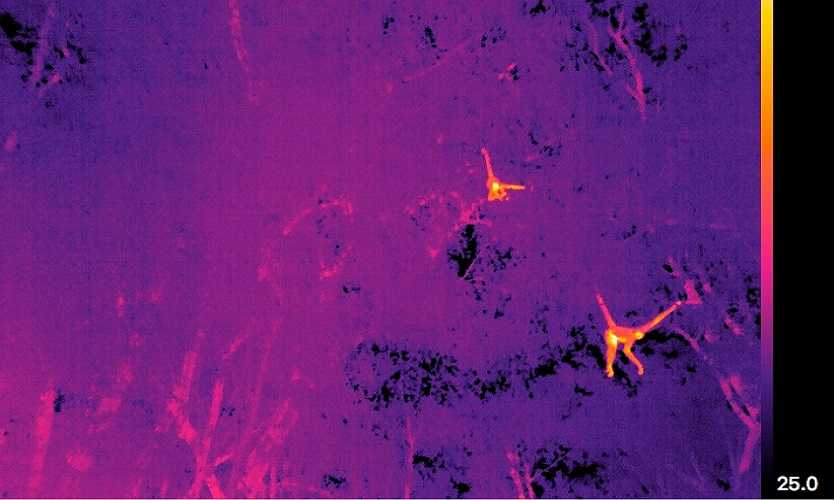Thermal ‘fingerprinting’ to help conserve rare animals in Madagascar

Scientific methods developed at Liverpool John Moores University and Chester Zoo to count animals from the air are being adopted in the wilds of Madagascar.
Trials last year at Chester Zoo and Knowsley Safari Park showed that thermal techniques could pick up animals on the ground from the heat they gave off, even through tree cover.
The work has now been identified by UK Research and Innovation for its Global Challenges Innovation and Commercialisation Programme, and received more than £570,000 funding.
Madagascar is a biodiversity hotspot; over 90% of its wildlife is found nowhere else on Earth but its’ diverse ecosystems are threatened by agriculture and climate change.
The team from Liverpool John Moores University, which unites physicists with ecologists, drone engineers and computer scientists, will work with island authorities to embed the technology into regional conservation practices.
Professor Steven Longmore of the LJMU Astrophysics Research Institute, says it’s a simple idea in essence: “All we are doing is to adapt a physics approach to a biology challenge.
Unique thermal fingerprint
“Every species has a unique thermal fingerprint, so, once we detect them, we can use machine learning to tell them apart.”
The aim is for conservationists to fly drones with mounted thermal infrared cameras at varying altitudes over island habitats. This could range from 50 to 120 metres altitude dependant on the size of animal they are searching for. Using advanced artificial intelligence to identify species from a heat map, the technique could be a game-changer for gathering data on the island’s wild animals.
A recent study by LJMU successfully identified spider monkeys with drones and found that in 83% of cases drones were more accurate in their ‘head counts’ of large groups than on-the-ground surveys.
Professor of Primate Biology Serge Wich, who was involved in the published research, explained: “Accurate and precise population estimates are vital because they form the basis of conservation action.
“Of course, animals are very difficult to see with optical cameras particularly in forests and many are naturally camouflaged. But their thermal glow is unmistakeable, so we are talking about a much more effective way of tracking them.”
And cheaper too. Thermal cameras can cost as little as £2,000 and are light enough to be mounted on a drone.
Sustainable practices
Dr Owen McAree, a senior researcher in Prof Wich’s team and a member of the UK Government’s Drone Industry Action Group, will join the project which seeks to establish drone surveillance as an integral part of conservation at a national level in Madagascar.
“Clearly, the only the people of Madagascar themselves can ensure that the practices we teach them are sustainable in the medium to long term, so our aim is to fully train them in drone flight and engineering methods.”
Partners in the £570,000 project include the Government of Madagascar and the Durrell Wildlife Conservation Trust which runs Jersey Zoo and takes its’ name from the famed author and naturalist Gerald Durrell, and has run a large conservation programme in Madagascar for the past 30 years.
Dr Mike Hudson of the Trust says: ‘This is an incredibly exciting project, with the potential to revolutionise the way we monitor some of the most threatened species in Madagascar, and some of the threats facing them.
“At one site, this technology could make our monitoring of a Critically Endangered lemur species not only more accurate, but also more efficient, ensuring the limited resources available for conservation stretch as far as possible.”
The two-year project will start this week with a delegation from Madagascar arriving in Liverpool this autumn and the LJMU team jetting out in January 2020.
- UK Research and Innovation (UKRI) has awarded 18 international partnerships, £14.8M – shared between UK HEIs and global research partners. They are specifically aimed to deliver scalable solutions make their lives and environments healthier, safer and more sustainable.


